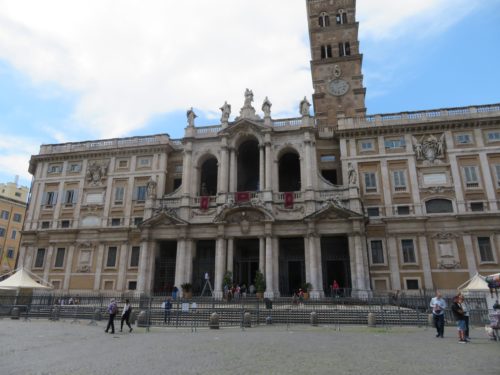On my first trip to Italy, I only had time to see three of the four major basilicas. I knew that when I’d one day return, St. Mary Major (or, in Italiano, Santa Maria Maggiore) would be my first stop. I promise that when we planned this year’s pilgrimage I didn’t know it was a ten-minute walk from the hotel!

Rome is a fascinating city, with centuries-old ruins beside modern structures, and massive basilicas in the middle of busy intersections. Best of all is walking into these churches, feeling the bustle melt away and, in this particular case, being greeted by the largest Marian church in Rome.
It’s impossible to take it all in at once, standing in awe before larger-than-life paintings and sculptures of the saints. I didn’t know what lay beneath the altar, but saw people descending the double staircases, so I followed. I wasn’t expecting the Crypt of the Nativity, which is said to contain wood from Jesus’s crib.
I’m generally skeptical of Jesus relics, but just the thought of it took me aback. Real or not, I stared for a long time at that ancient wood. I imagined maybe it could be true. I eavesdropped on a small tour group nearby, and watched its women kneel before the crib. I joined in, with no concrete prayer in mind, but it felt right.
With the hotel so close by, I visited again later in the week for Sunday Mass. Despite researching English Masses several times, this is not where I ended up—the elaborate side chapel that looked full of tourists was in Italian (who says all tourists speak English?). But I remained anyway. I’d always wanted to attend Mass in a foreign language, so why not in a major basilica?

I also learned this particular chapel was designed by Michaelangelo. Look at that detail!
It’s said that you can attend Mass anywhere, that it’s the same wherever you go. My (very) limited Italian offered a vague idea of what was said, but I knew enough to recognize Jesus’s name (Gesù) and make the sign of the cross. I absorbed every moment of the Eucharist, from rising from the pew, waiting beneath those sweeping frescos, and accidentally taking the long way back to my seat. The Eucharist is the same wherever you go, regardless of language. It wasn’t lost to me how I’ll probably never again receive Him like that, in a major basilica, beneath Michelangelo’s masterpieces.
The day prior had been a wearying day of tourism, and I’d miraculous made it to 8 a.m. Mass. We didn’t have anything concrete scheduled for that Sunday, so I took my time leaving. Though I’d said this basilica was a must for my “next” visit, I hadn’t thought when, or if, that would actually happen. It ended up being much more than checking a church off the “to-see” list.

